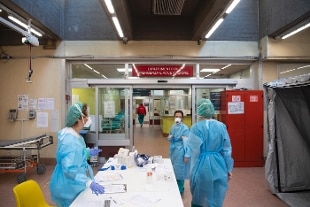- Coronavirus, 10 tips to avoid contagion
- Galli: "We need to change our habits"
Share
March 09, 2020 Symptoms to watch out for, numbers to call, how to protect family members, where to get tested. These are the contents of the short guide published today by the Istituto Superiore di Sanità (ISS) and produced in collaboration with the European Center for Disease Control (Ecdc) and the Ministry of Health. The vademecum "What to do in case of doubt", in eight points, is dedicated in particular to people who have symptoms such as to raise suspicion of contagion from COVID-19 and who can find information in this guide for assistance.- These are the relevant symptoms
Fever and flu-like symptoms such as cough, sore throat, shortness of breath, muscle pain, fatigue are signs of a possible new coronavirus infection.
- What to do in case of fever and / or flu symptoms
If in the past 14 days you have been in close contact with a person infected with Covid-19 or in an area at risk or at work in a healthcare facility with Covid-19 patients, you must remain at home and call the family doctor, the pediatrician or the medical guard.
- When to call the doctor
Immediately. "If you think you are infected, call as soon as you feel the symptoms of respiratory infection, explaining the symptoms and contacts at risk" specify Iss, Ministry of Health and Ecdc.
- If you are unable to contact your family doctor
Contact one of the emergency numbers indicated on the website www.salute.gov.it/nuovocoronavirus
- Do not go directly to the emergency room or to the doctor
You cannot go directly to the emergency room or to an outpatient clinic without first having agreed with your doctor. Otherwise, you risk infecting other people.
- How to protect your family members
Personal hygiene behaviors should always be followed (washing hands regularly with soap and water or using an alcohol-based gel) and keeping the environment clean. "If you think you are infected - read the handbook - wear a surgical mask, stay away from your family and often disinfect everyday objects".
- Where to take the test
The tests are performed only in selected National Health Service laboratories. If your doctor thinks a test is needed, he will give you directions on how to proceed.
- Where to find other reliable information
Follow only the specific and updated indications of official websites, local authorities and Civil Protection.

